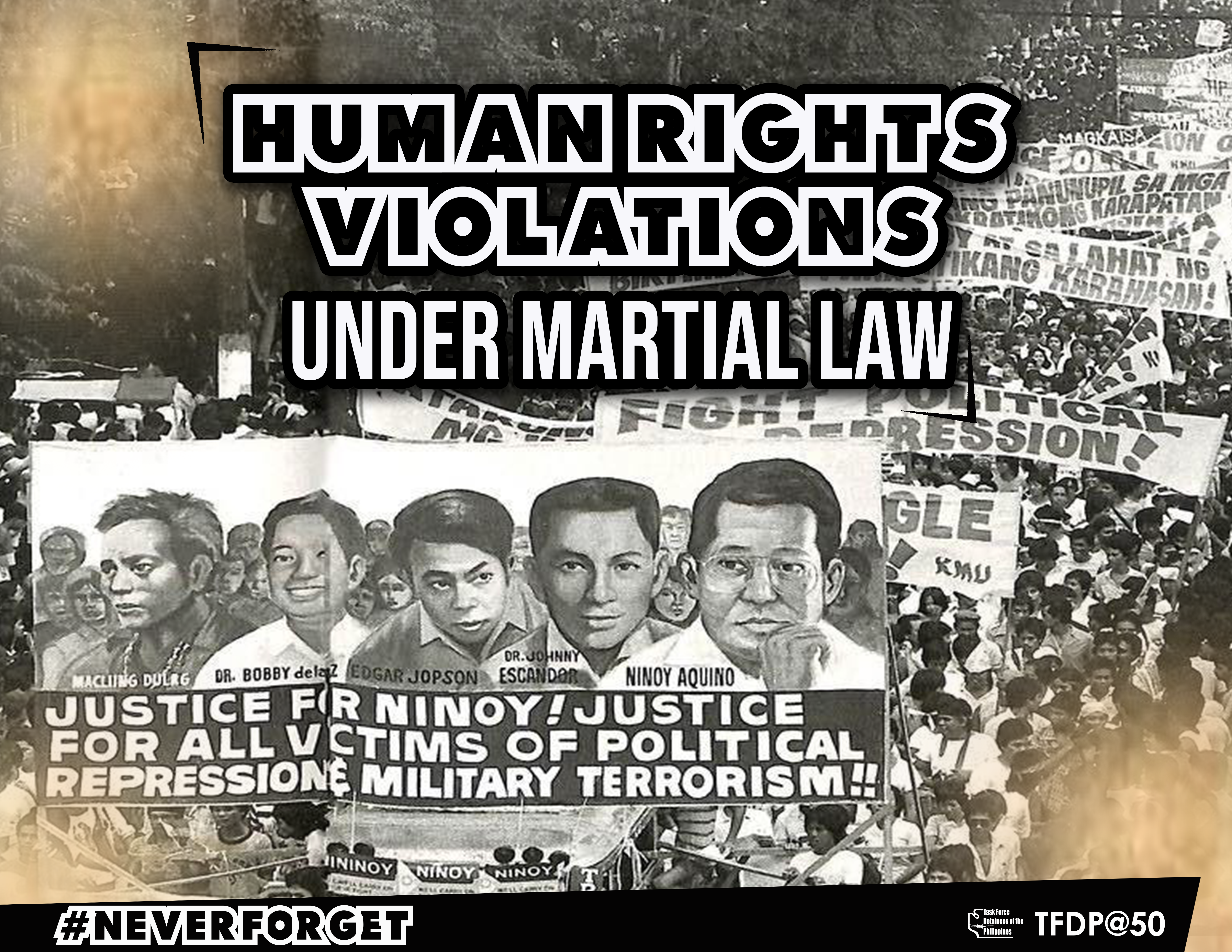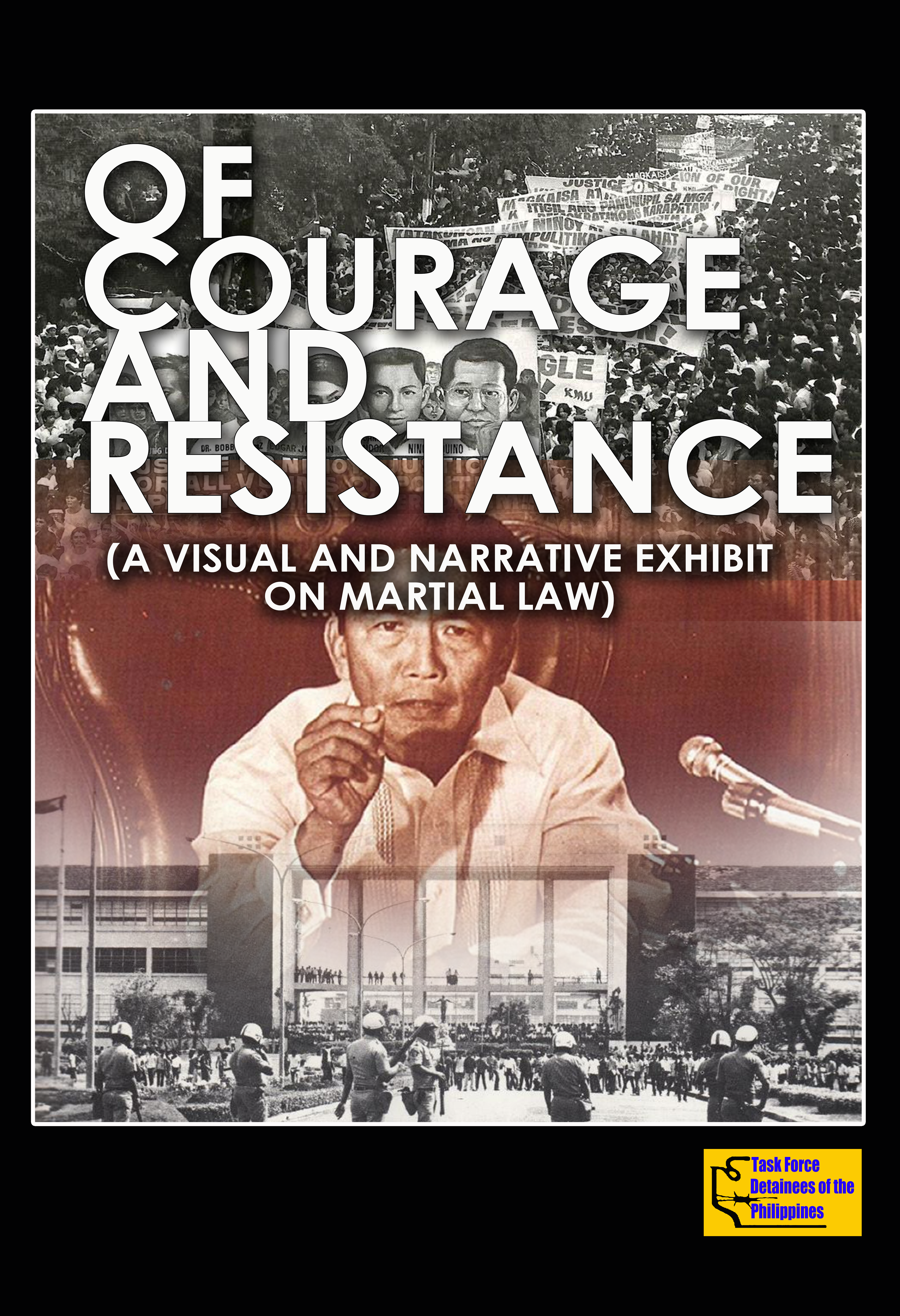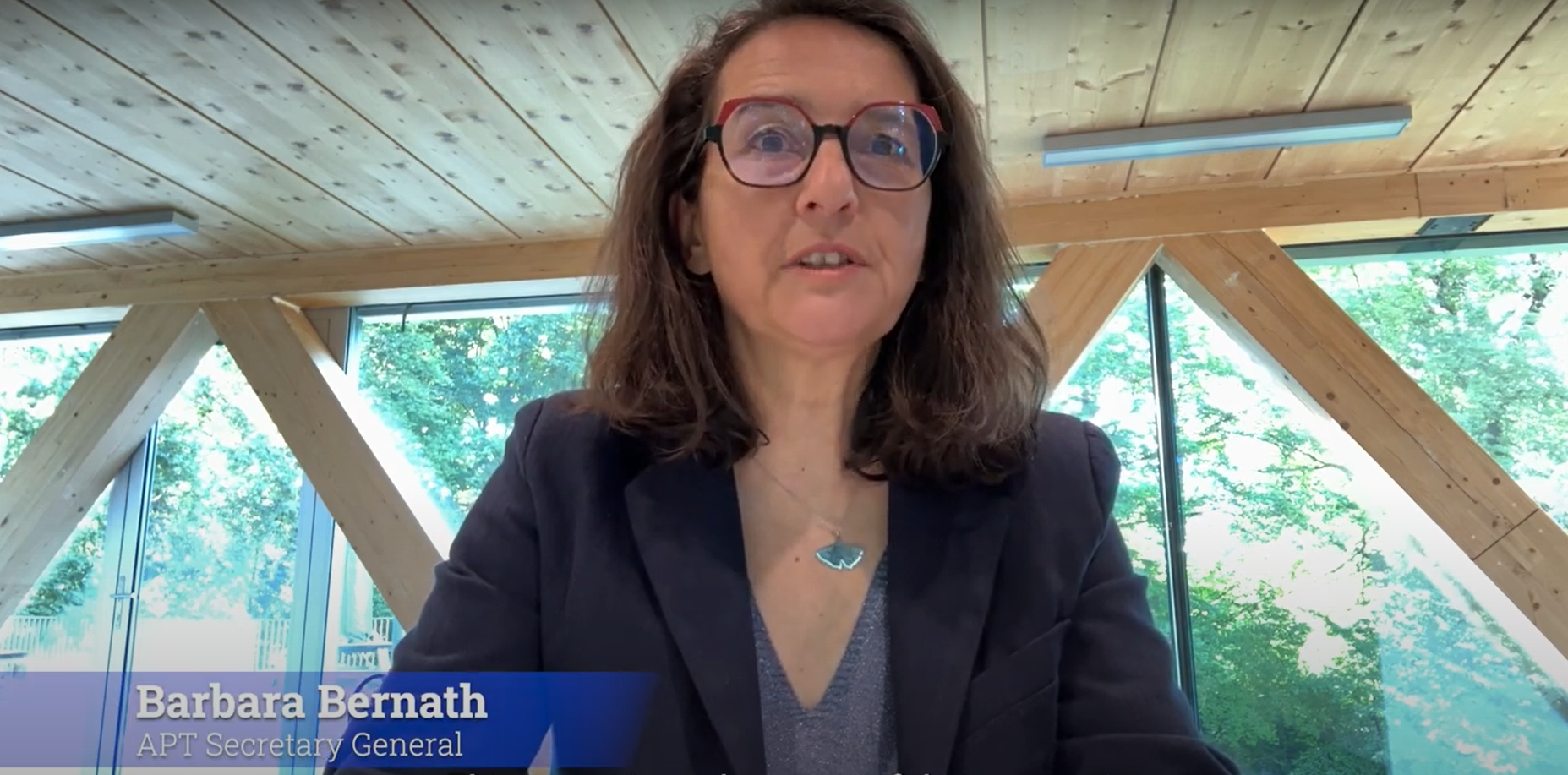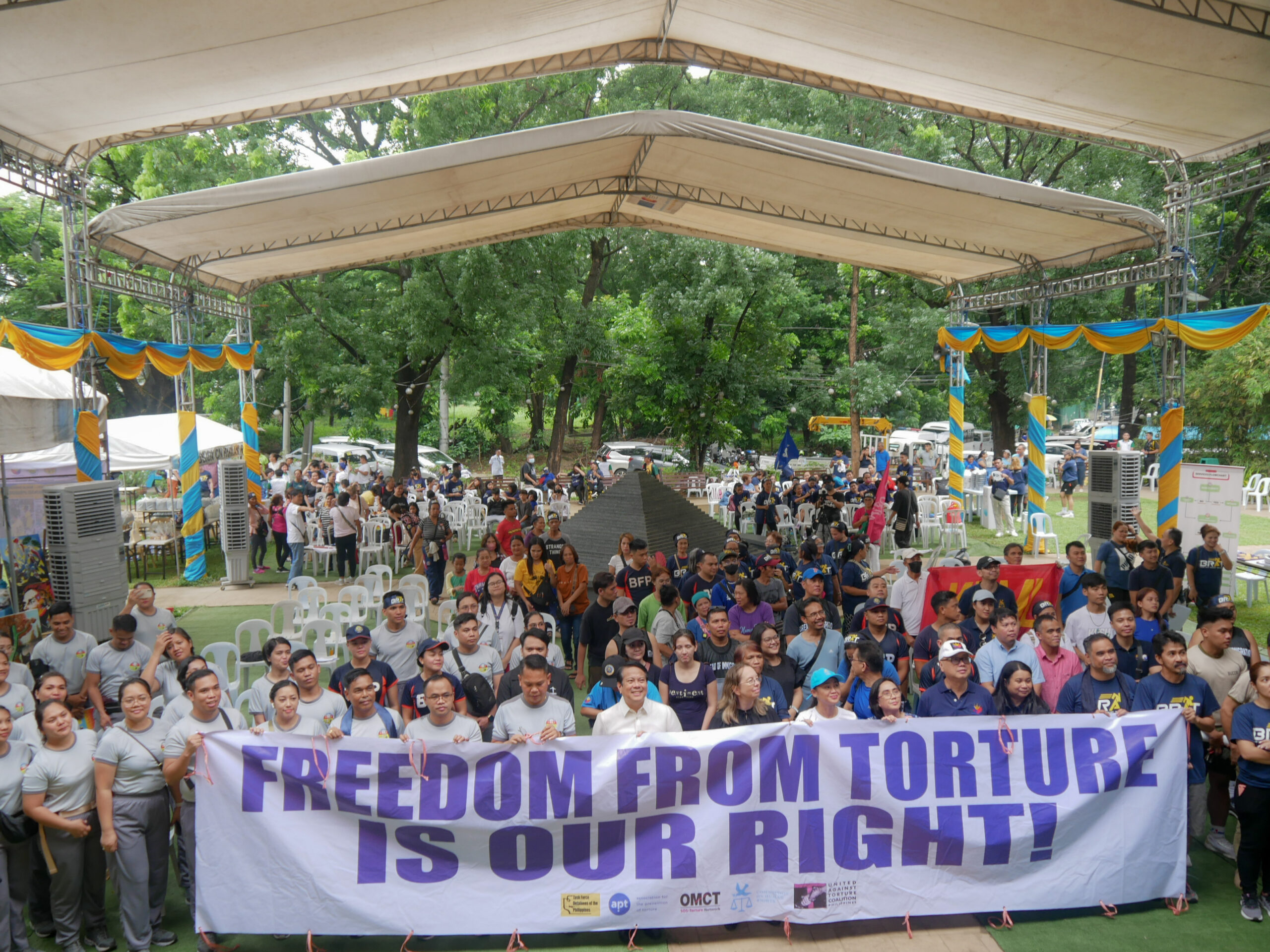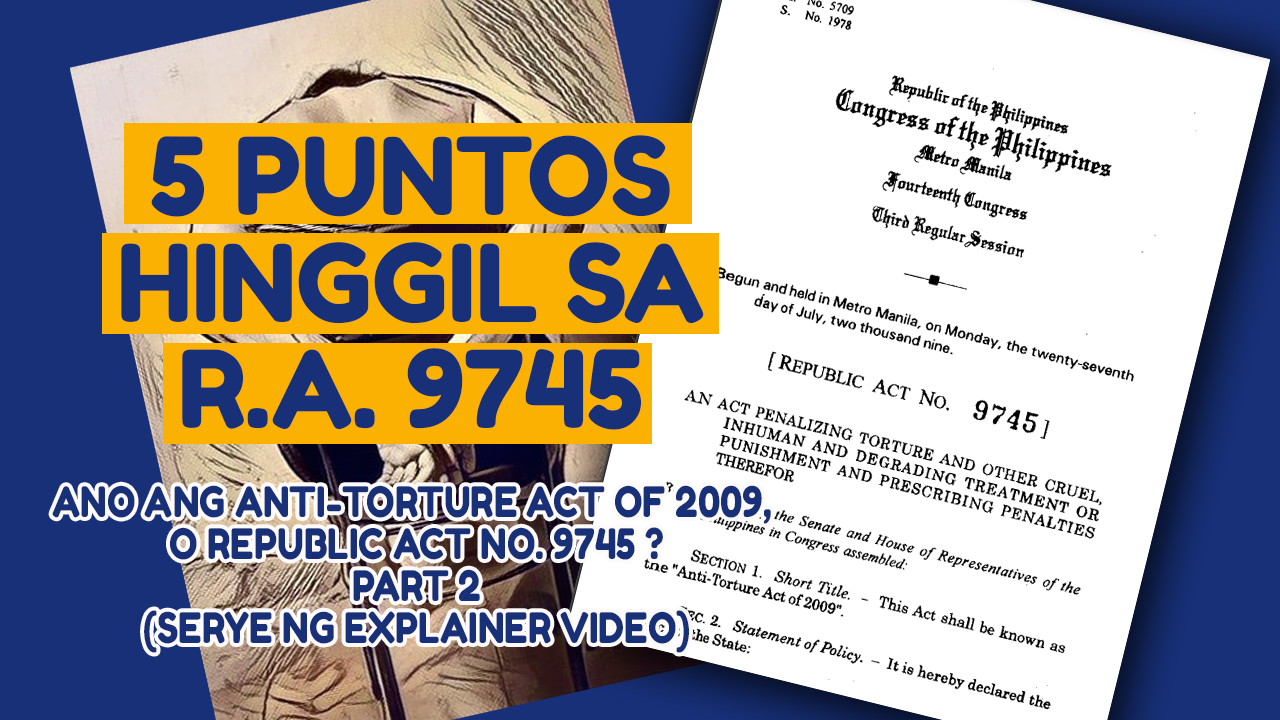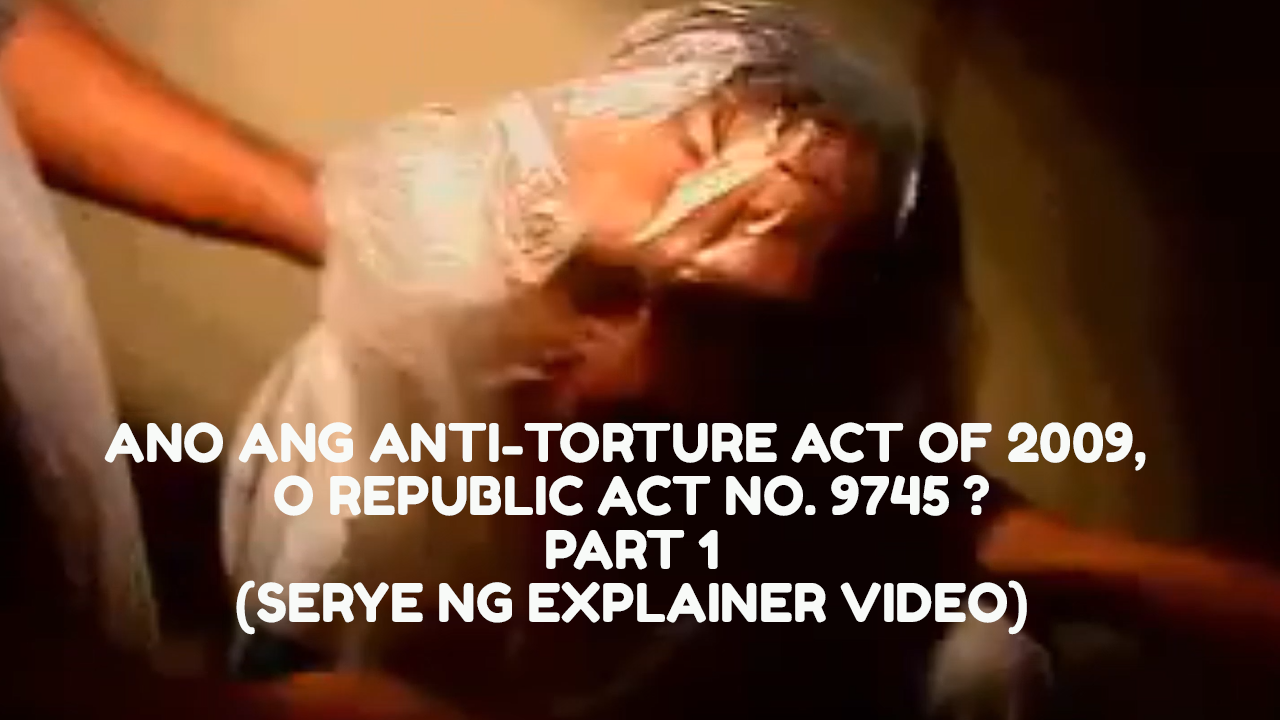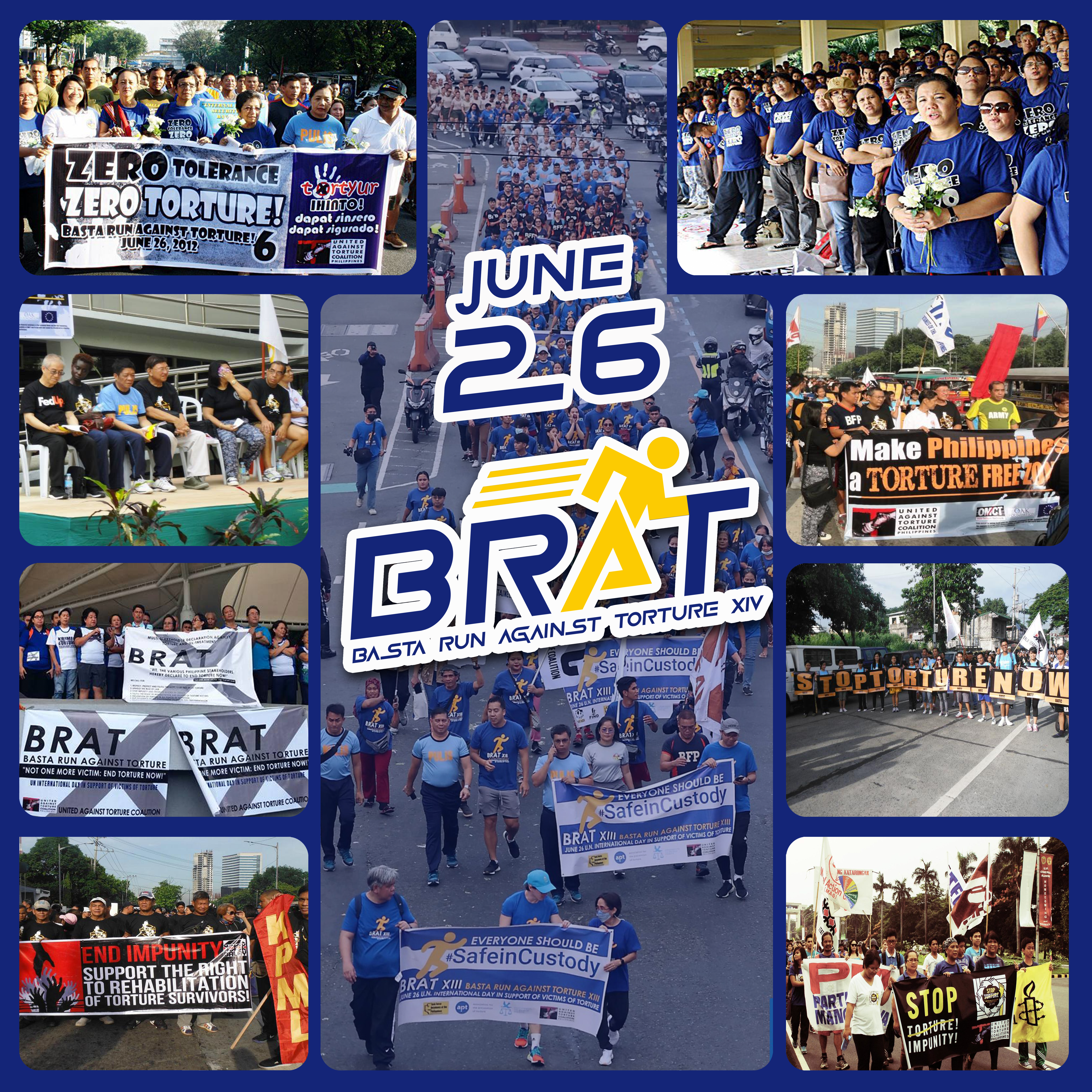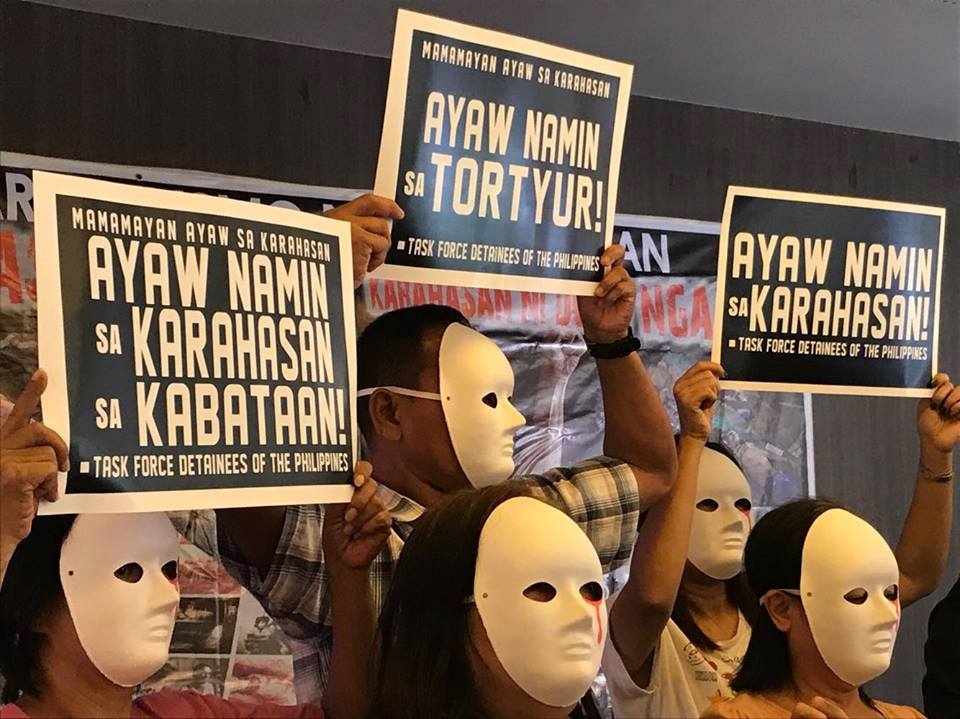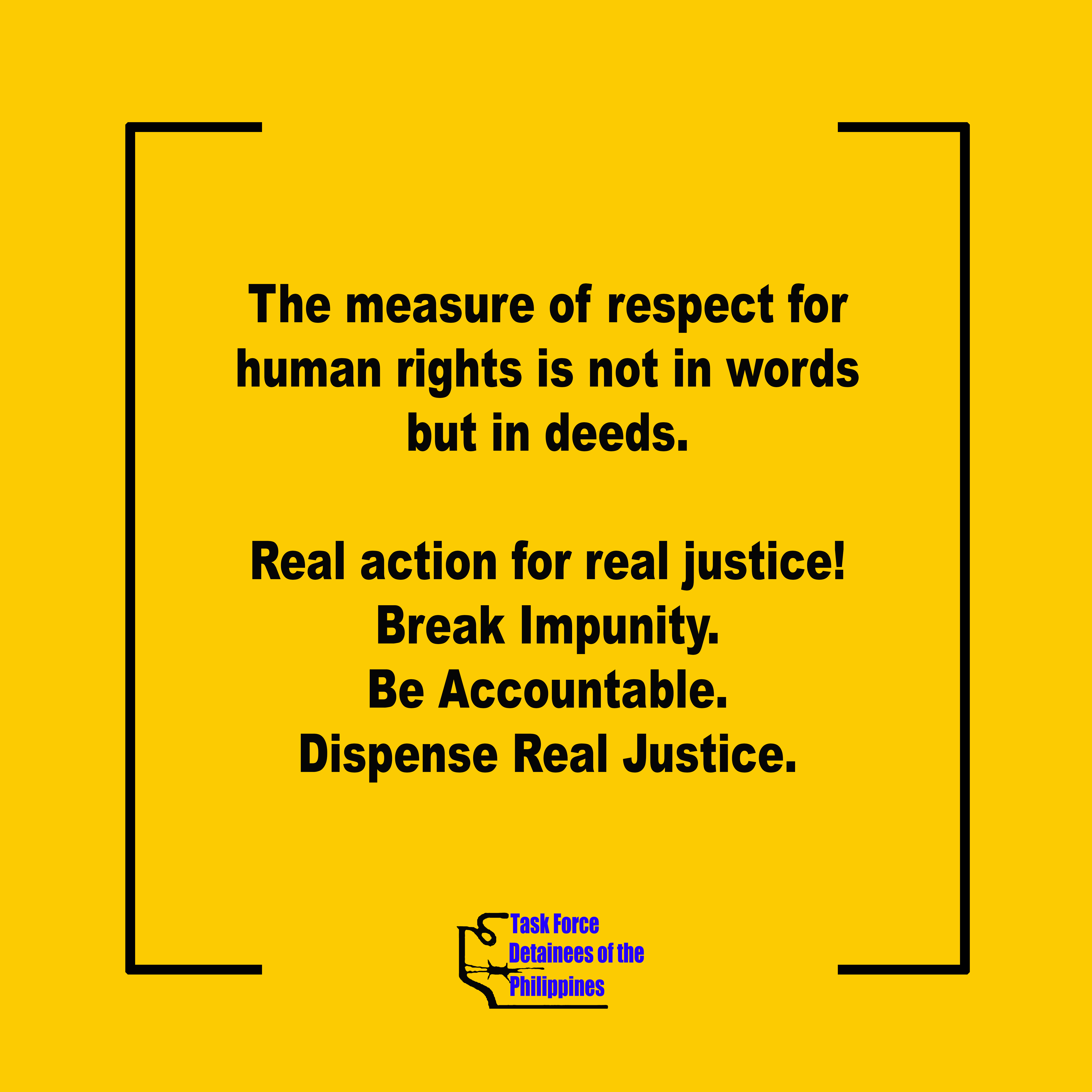During Martial Law in the Philippines under the late President Ferdinand Marcos Sr., numerous human rights were systematically violated. Here are some of the key human rights abuses documented during that period: Arbitrary Arrests and Detentions: Thousands of individuals, including political opponents, activists, journalists, and ordinary citizens, were arrested without warrants and detained without charges. Many were imprisoned for extended periods without trial. Torture: Detainees, particularly those suspected of being subversives or critics of the regime, were subjected to various forms of torture. Methods included electric shock, waterboarding, beatings, and psychological torture. Enforced Disappearances: Many individuals were […]
Idineklara ni Marcos ang Batas Militar noong Setyembre 21, 1972, sa bisa ng Proklamasyon Blg. 1081. Subalit, hindi ito agad isinapubliko hanggang Setyembre 23, 1972.Narito ang sampung mahahalagang katotohanan tungkol sa deklarasyon ng Batas Militar: [1. Proclamation No. 1081]Ang Batas Militar ay ipinatupad sa ilalim ng Proklamasyon Blg. 1081 noong Setyembre 21, 1972, ngunit ipinahayag lamang ito sa publiko dalawang araw ang makalipas. [2. Stated Reasons]Ginamit ni Marcos ang banta ng komunismo bilang dahilan upang ipatupad ang Batas Militar, kabilang na ang pambobomba sa Plaza Miranda at umano’y tangkang pagpatay kay Defense Minister Juan Ponce Enrile. [3. Suppression of Civil […]
In the late 1960s and early 1970s, the Philippines was a nation on the brink of chaos. Economic disparity, rampant corruption, and widespread social unrest plagued the country. Student protests erupted across universities, labor strikes paralyzed industries, and the communist insurgency gained momentum in rural areas. President Ferdinand Marcos, facing the end of his second term and the threat of losing power, exploited these crises to justify an unprecedented move. Claiming that the nation was on the verge of anarchy, Marcos declared Martial Law on September 21, 1972. This allowed him to dissolve Congress, silence the media, arrest political opponents, […]
“Join Barbara Bernath, Secretary-General of the Association for the Prevention of Torture, as she champions the cause of human dignity at the Basta Run Against Torture XIV. Let’s unite for a world free from torture. #EndTorture #SupportVictims #BastaRun2024” In this powerful video message, Barbara Bernath, Secretary-General of the Association for the Prevention of Torture (APT), speaks passionately about the urgent need to end torture worldwide. Addressing participants of the Basta Run Against Torture XIV, held on June 26th in honor of the International Day in Support of Victims of Torture, Bernath highlights the critical role of collective action and solidarity. […]
On June 26, The Task Force Detainees of the Philippines (TFDP), the Commission on Human Rights of the Philippines (CHR), and the United Against Torture Coalition (UATC)-Philippines joined hands with representatives of the Philippine government, Civil Society Organizations and torture survivors and their families, to observe the UN International Day in Support of Victims of Torture through ‘Basta! Run Against Torture (BRAT) XIV’ with the theme “Freedom from Torture Is Our Right.” Held in Quezon City, this significant event aims to contribute to the global campaign against torture worldwide and effective implementation of the Anti-Torture Law. The inaugural BRAT was […]
Ang limang puntos ng Republic Act No. 9745 o ang “Anti-Torture Act of 2009”: Paglalarawan at Pagbabawal ng Torture: Ang batas ay naglalarawan ng torture bilang anumang gawaing nagdudulot ng matinding pisikal o mental na sakit, ipinapataw ng mga taong may kapangyarihan para sa pagkuha ng impormasyon, pagpaparusa, o pananakot. Mahigpit nitong ipinagbabawal ang anumang uri ng torture at di-makataong pagtrato o parusa. Sakop ng Batas at Pananagutan: Sakop nito ang lahat ng taong may kapangyarihan tulad ng mga opisyal ng pulisya, militar, at iba pang pampublikong opisyal. Ang mga ito ay pananagutin sa ilalim ng batas kung […]
Ang Anti-Torture Act of 2009, na kilala rin bilang R.A. 9745, ay isang mahalagang batas na naglalayong pigilan at parusahan ang torture at iba pang malupit, di-makatao, o nakapapahiyang pagtrato o parusa. Ang batas na ito ay mahalaga sa pagpapanatili ng karapatang pantao at pagsigurong igagalang ang dignidad ng bawat indibidwal, ayon sa Saligang Batas ng Pilipinas at iba’t ibang pandaigdigang kasunduan. Naipasa noong Nobyembre 10, 2009, ang R.A. 9745 ay tugon sa lumalaking pangangailangan para sa mas mahigpit na mga hakbang laban sa torture. Ito ay alinsunod sa pangako ng Pilipinas sa United Nations Convention Against Torture, na pinagtibay […]
A Brief History of Basta! Run Against Torture (BRAT) The Basta! Run Against Torture (BRAT) began its journey on June 25, 2002, marking the start of a national campaign for freedom from torture in the Philippines. Organized by the UATC-Philippines, this inaugural event aimed to intensify efforts towards the enactment of the Anti-Torture Law, a goal which would see fruition with the law’s passage in November 2009. BRAT has played a crucial role in the campaign against torture, contributing significantly to the Philippines’ ratification of the Optional Protocol to the Convention Against Torture (OPCAT) in April 2012. Each year, BRAT […]
Introduction The Republic Act No. 9745, also known as the “Anti-Torture Act of 2009,” is a landmark piece of legislation in the Philippines aimed at preventing and addressing acts of torture and other cruel, inhuman, or degrading treatment or punishment. Complementing this act is the National Preventive Mechanism (NPM), is part which, though not yet established, is long overdue. The Philippines became a State party to the Optional Protocol to the Convention Against Torture and Other Cruel, Inhuman or Degrading Treatment or Punishment (OPCAT) in 2012. However, it is notably overdue in establishing NPM as required by the OPCAT. In […]
[Statement] Real action for real justice! Break Impunity! Task Force Detainees of the Philippines (TFDP) welcomes any and all efforts to promote, protect and defend human rights. The creation of the Special Committee on Human Rights Coordination (Special Committee) under Administrative Order No. 22, however, starts on the wrong foot with no meaningful consultation and participation from human rights and civil society groups. This is contrary to the claim of the Department of Justice (DOJ) in its March 8, 2024 Facebook post that “CSOs participation is indispensable in the whole-of-nation approach for the promotion and protection of human rights … […]
Facebook Feed
During Martial Law in the Philippines under the late President Ferdinand Marcos Sr., numerous human rights were systematically violated. Here are some of the key human rights abuses documented during that period: Arbitrary Arrests and Detentions: Thousands of individuals, including political opponents, activists, journalists, and ordinary citizens, were arrested without warrants and detained without charges. Many were imprisoned for extended periods without trial. Torture: Detainees, particularly those suspected of being subversives or critics of the regime, were subjected to various forms of torture. Methods included electric shock, waterboarding, beatings, and psychological torture. Enforced Disappearances: Many individuals were […]
Idineklara ni Marcos ang Batas Militar noong Setyembre 21, 1972, sa bisa ng Proklamasyon Blg. 1081. Subalit, hindi ito agad isinapubliko hanggang Setyembre 23, 1972.Narito ang sampung mahahalagang katotohanan tungkol sa deklarasyon ng Batas Militar: [1. Proclamation No. 1081]Ang Batas Militar ay ipinatupad sa ilalim ng Proklamasyon Blg. 1081 noong Setyembre 21, 1972, ngunit ipinahayag lamang ito sa publiko dalawang araw ang makalipas. [2. Stated Reasons]Ginamit ni Marcos ang banta ng komunismo bilang dahilan upang ipatupad ang Batas Militar, kabilang na ang pambobomba sa Plaza Miranda at umano’y tangkang pagpatay kay Defense Minister Juan Ponce Enrile. [3. Suppression of Civil […]
In the late 1960s and early 1970s, the Philippines was a nation on the brink of chaos. Economic disparity, rampant corruption, and widespread social unrest plagued the country. Student protests erupted across universities, labor strikes paralyzed industries, and the communist insurgency gained momentum in rural areas. President Ferdinand Marcos, facing the end of his second term and the threat of losing power, exploited these crises to justify an unprecedented move. Claiming that the nation was on the verge of anarchy, Marcos declared Martial Law on September 21, 1972. This allowed him to dissolve Congress, silence the media, arrest political opponents, […]
“Join Barbara Bernath, Secretary-General of the Association for the Prevention of Torture, as she champions the cause of human dignity at the Basta Run Against Torture XIV. Let’s unite for a world free from torture. #EndTorture #SupportVictims #BastaRun2024” In this powerful video message, Barbara Bernath, Secretary-General of the Association for the Prevention of Torture (APT), speaks passionately about the urgent need to end torture worldwide. Addressing participants of the Basta Run Against Torture XIV, held on June 26th in honor of the International Day in Support of Victims of Torture, Bernath highlights the critical role of collective action and solidarity. […]
On June 26, The Task Force Detainees of the Philippines (TFDP), the Commission on Human Rights of the Philippines (CHR), and the United Against Torture Coalition (UATC)-Philippines joined hands with representatives of the Philippine government, Civil Society Organizations and torture survivors and their families, to observe the UN International Day in Support of Victims of Torture through ‘Basta! Run Against Torture (BRAT) XIV’ with the theme “Freedom from Torture Is Our Right.” Held in Quezon City, this significant event aims to contribute to the global campaign against torture worldwide and effective implementation of the Anti-Torture Law. The inaugural BRAT was […]
Ang limang puntos ng Republic Act No. 9745 o ang “Anti-Torture Act of 2009”: Paglalarawan at Pagbabawal ng Torture: Ang batas ay naglalarawan ng torture bilang anumang gawaing nagdudulot ng matinding pisikal o mental na sakit, ipinapataw ng mga taong may kapangyarihan para sa pagkuha ng impormasyon, pagpaparusa, o pananakot. Mahigpit nitong ipinagbabawal ang anumang uri ng torture at di-makataong pagtrato o parusa. Sakop ng Batas at Pananagutan: Sakop nito ang lahat ng taong may kapangyarihan tulad ng mga opisyal ng pulisya, militar, at iba pang pampublikong opisyal. Ang mga ito ay pananagutin sa ilalim ng batas kung […]
Ang Anti-Torture Act of 2009, na kilala rin bilang R.A. 9745, ay isang mahalagang batas na naglalayong pigilan at parusahan ang torture at iba pang malupit, di-makatao, o nakapapahiyang pagtrato o parusa. Ang batas na ito ay mahalaga sa pagpapanatili ng karapatang pantao at pagsigurong igagalang ang dignidad ng bawat indibidwal, ayon sa Saligang Batas ng Pilipinas at iba’t ibang pandaigdigang kasunduan. Naipasa noong Nobyembre 10, 2009, ang R.A. 9745 ay tugon sa lumalaking pangangailangan para sa mas mahigpit na mga hakbang laban sa torture. Ito ay alinsunod sa pangako ng Pilipinas sa United Nations Convention Against Torture, na pinagtibay […]
A Brief History of Basta! Run Against Torture (BRAT) The Basta! Run Against Torture (BRAT) began its journey on June 25, 2002, marking the start of a national campaign for freedom from torture in the Philippines. Organized by the UATC-Philippines, this inaugural event aimed to intensify efforts towards the enactment of the Anti-Torture Law, a goal which would see fruition with the law’s passage in November 2009. BRAT has played a crucial role in the campaign against torture, contributing significantly to the Philippines’ ratification of the Optional Protocol to the Convention Against Torture (OPCAT) in April 2012. Each year, BRAT […]
Introduction The Republic Act No. 9745, also known as the “Anti-Torture Act of 2009,” is a landmark piece of legislation in the Philippines aimed at preventing and addressing acts of torture and other cruel, inhuman, or degrading treatment or punishment. Complementing this act is the National Preventive Mechanism (NPM), is part which, though not yet established, is long overdue. The Philippines became a State party to the Optional Protocol to the Convention Against Torture and Other Cruel, Inhuman or Degrading Treatment or Punishment (OPCAT) in 2012. However, it is notably overdue in establishing NPM as required by the OPCAT. In […]
[Statement] Real action for real justice! Break Impunity! Task Force Detainees of the Philippines (TFDP) welcomes any and all efforts to promote, protect and defend human rights. The creation of the Special Committee on Human Rights Coordination (Special Committee) under Administrative Order No. 22, however, starts on the wrong foot with no meaningful consultation and participation from human rights and civil society groups. This is contrary to the claim of the Department of Justice (DOJ) in its March 8, 2024 Facebook post that “CSOs participation is indispensable in the whole-of-nation approach for the promotion and protection of human rights … […]


